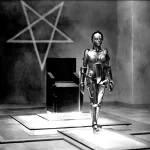Home Video Hovel: Salvation Army, by Craig Schroeder
The most I know about Casablanca – Morocco’s coastal metropolis – is that it’s as good a place as any to organize a resistance movement and that it has at least one cafe that can provide a stiff drink and good tunes. In Abdellah Taia’s mostly autobiographical film Salvation Army (based on his novel of the same name), Casablanca’s cultural identity is brought into sharp focus through the eyes of a young gay boy, growing up in a Muslim, heteronormative society. The film is delicate and sensitive, but may have been better off in the hands of a more experienced director. Salvation Army’s study in melancholy oppression often veers off-course, resulting in a slow-burn that, unfortunately, never finds a pay-off.
Abdellah (the character, named after his creator) is one of nearly a dozen kids living in a small house in Casablanca, Morocco. His father is abusive and his mother is dictatorial. His younger brothers and sisters are all too young to effectively change their situation and Abdellah’s older brother, whom he idolizes, has moved out. Abdellah himself is a pre-teen boy just discovering his homosexuality, in a culture that shuns it, which frequently results in him exploring sex with older – seemingly predatory – men. Taia is trying to make a picture that not only tells his story but does so in a way that is intended to consciously divorce the western world from their preconceived notions of what sexuality in a Muslim country looks like. His approach to recreating his own adolescence is understated and measured, but perhaps too measured, as long stretches of the film are dedicated to small, microcosmic moments – albeit monumental in retrospect – that Taia can never connect to a larger thesis.
There’s not a lot of structure to Salvation Army. Taia is consciously bucking up against the restraints of a traditional three act structure; but he doesn’t have the skills to effectively break the rules of cinematic narrative form. Just as the film begins to build a head of steam, there is a time jump – picking up with Abdellah ten years later – that destabilizes the film’s already precarious structure. It’s an ineffective technique; Abdellah’s life hasn’t changed enough to make the child-to-adult dichotomy work. Ten years later and the film is stuck floundering in the same dead-end themes. Salvation Army already has an uneven pace which completely falls apart when the film jumps forward.
For his part, Said Mrini (who plays Abdellah at pubescence) brings a lot of meat to a character who is nothing but skin and bones on the page. When Abdellah surreptitiously meets an older man for sex, Mrini brings to life a wonderful bit of unspoken conflict: a teenage boy intrigued by sexual contact who is equally afraid and victimized by the precarious situation in which he is forced to obtain it. There is no large existential threat in Salvation Army, instead, all of the conflict is internalized, roiling beneath the surface. A performance from an inferior child actor may have flattened Abdellah’s character, the film’s strongest component.
Though the film is not a success, it is an admirable failure. Every frame feels deeply personal and genuine (and it takes a filmmaker with chutzpah to make a film about love and sex set in Casablanca), but Taia just can’t hold the whole thing together. Instead of one complete story, much of Salvation Army feels like reading every third chapter of a great novel: you are sure to read something beautiful and profound, but you’re also deprived of the bits that make the story complete.



























